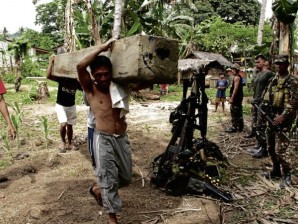
SOLDIERS guard the hauling of seized logs during a recent operation in Lanao del Norte against logging syndicates. RICHEL UMEL/INQUIRER MINDANAO
MANILA, Philippines—About half a million Filipinos are losing their jobs in Mindanao as a consequence of the government’s drive against illegal loggers, and many of them may turn to crime, according to the embattled head of the Anti-Illegal Logging Task Force.
This worrisome picture of timber-dependent communities in Mindanao, particularly the Caraga region, was presented by the task force’s executive director, Renato Miranda, a retired general who is himself facing accusations of protecting illegal logging interests.
“While the government is winning in its campaign against massive illegal logging in Mindanao, about half a million individuals are losing their jobs and their only source of income to feed their families,” he said in the task force’s accomplishment report for July.
He said the scenario “worries” most of the local governments in Mindanao, especially in Caraga, which consists of the provinces of Agusan del Sur, Agusan del Norte, Surigao del Sur, Surigao del Norte and Dinagat.
“If this will not be addressed immediately, crimes such as holdups, snatching and even kidnapping are expected to increase tremendously, affecting the highly urbanized cities of Butuan, Tagum, Cabadbaran, Surigao City and many others,” Miranda said.
In the subsequent accomplishment report for August, he pushed this point further by saying the implementation of Executive Order No. 23, which sought to further intensify the anti-illegal logging campaign in Mindanao, has “created economic and social implications.”
“Timber industry is one of the common sources of livelihood in Eastern Mindanao. The sudden stoppage of logs supply from the natural and residual forests makes it difficult for the WPPs (wood processing plants) to thrive on planted species alone and importation,” he said.
Miranda was described as a protector of illegal loggers and financiers in a recent report by an informant of the Department of the Interior and Local Government, Isoceles P. Otero, who was designated by the late Interior Secretary Jesse Robredo as a special assistant.
Otero has not provided evidence for his claims, saying he would do so at the proper time, while Miranda has denied the sweeping allegations and offered to quit his post to save the organization.
In the August report, Miranda cited significant gains in the efforts of his Mindanao-based task force to curb illegal logging in Caraga and Northern Mindanao.
“Based (on) the statistics of the apprehended illegally cut logs for the month of August, there was a rapid decrease in the volume as compared to previous months. Most of the apprehensions this month were (of) lumber loaded in conveyances,” he said.
He said the illegal loggers now find it very hard to sell their illegally cut logs and lumber to wood processing plants because of the active presence of the task force.
“The illegal logs seized by the task force were found at the following locations — along the rivers, warehouses, furniture shop, and along the road during transport,” Miranda said.
On Aug. 1, almost 300 pieces of lauan and other logs valued at P1 million were confiscated at Sitio Towa-Towa, Barangay Carmen; in Sitio Babay, Barangay San Jose; and in Sitio Baclinan, Barangay Kawayanan, all in Boston town, Davao Oriental.
The next day, the task force confiscated a ten-wheel truck allegedly belonging to a “cultist” organization with illegal logging operations.
“The blatant cutting of trees (both planted and naturally grown species) utilizing chain saws, wreckers and ten wheeler haulers are strong indications that indeed powerful persons are behind this illegal operation,” Miranda said.
He said illegal timber cutting in Mindanao “is an ordinary business among some misinformed individuals.”
“The perpetrators vary from businessmen, local government officials, professionals and the indigenous peoples,” most of them unaware of the severity of the crime, he said.
“To some perpetrators, it is not perceived as a crime and harmful to the environment; it is a way of doing business and others do it for subsistence. They are used to earn easy money and would not give up their comfort zone. There must be a way to re-orient the mindset of the people in the area,” he added.
Miranda recommended a few solutions to the displacement of people who used to earn a living only by cutting logs, including the provision of immediate assistance to the displaced workers through the government’s conditional cash transfer program.
He also suggested employing the displaced workers as forest rangers, and giving them alternative sources of timber, such as fast-growing tree species.
Miranda said he wanted to introduce the concept of “Spotty Forest” to affected communities.
“Under this new mindset, certain areas within natural or residual forests will be taken care of by the community such as the ‘lumad’ or group of families. In exchange for their management they will be given priority in properly harvesting the resources within the identified spotty area,” he said.
Part of the strategy will involve the planting of bamboo and suitable tree species, and high-value industrial crops such as coffee, cacao, and rubber, in identified areas under the social fencing concept, Miranda said.

